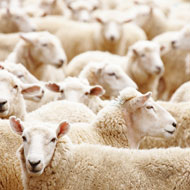
116 sheep found dead in Sussex
Over 100 sheep have been found dead at a farm in Sussex in what the NFU has described as the ‘UK’s worst sheep worrying incident in living memory’.
Farmer Gordon Wyeth at the West Dean Estate near Chichester made the shocking discovery on Monday afternoon (March 7).
Many of the sheep were pregnant and herded into a tight group against a fence. The farmer believes that they panicked and had either died from shock or were crushed in the flock.
The total number of sheep killed in the incident was 116 and were worth around £17,000. Police say that they are ‘all but 100 per cent certain’ that dogs caused their deaths.
"I have never seen or heard of sheep-worrying on this scale before and this was a terrible sight," said Sergeant Tom Carter from Sussex Police.
“While there are no signs of any of the animals being savaged, we are all but 100 per cent certain that their deaths were brought about by dogs.
"The flock was last checked around lunchtime on Sunday, so the incident could have occurred at any time over the next 24 hours. However, if as we suspect it was a dog attack, it may well have happened in daylight and we want to hear from anyone with information about it.
"This is not just about the Mr Wyeth's livelihood - and it will cost him at least another £2000 to dispose of the carcasses - but also his emotional attachment to the animals that he has raised and nurtured."
James Osman, the NFU adviser for Sussex, added: "This is the worst incident of its kind in living memory and talking to colleagues around the country, the number of deaths is double what we have come across in the past.
"We are in full support of the police's efforts to discover whose dog or dogs were responsible and urge anyone with information to get in touch with them."
Sussex Police say that they have seen a rise in sheep-worrying incidents. As Spring approaches owners are urged to keep their dogs on a lead while walking out in rural areas and around livestock.
Anyone with information about the incident is asked to email 101@sussex.pnn.police.uk.



 The latest
The latest